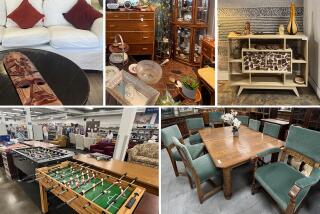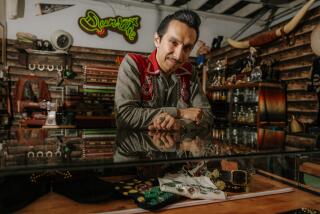Family Tree Turned Into Furniture
Sometimes you can’t afford the best if you are a collector with a small budget. But you can usually find the “almost best” at a better price. The furniture made in Eastwood, N.Y., from 1900 to 1915 by Gustav Stickley is considered the best of the American arts-and-crafts style.
Soon after Gustav’s furniture became popular, brothers George and Albert started making similar furniture. They were making furniture in Grand Rapids, Mich., but switched to the arts-and-crafts style. Their pieces were mass-produced and not handmade. Theirs resembled the oak pieces by Gustav.
The Stickley Brothers Co. continued working until 1907. Two other brothers, Leopold and George, started making furniture in Fayetteville, N.Y., in 1900. They also copied the styles of Gustav but often used veneers or laminated woods, not solid oak.
Another relative, Charles, made similar furniture in Binghamton, N.Y. It was labeled Stickley-Brandt Furniture Co. You can buy a good old piece of arts-and-crafts furniture by any of these Stickley companies. The pieces by Gustav could be from two to 10 times more expensive.
*
Question: My children gave me a hair receiver on Mother’s Day to add to my collection. It is marked “Trade (drawing of unicorn facing left) Mark/Wedgwood & Co. Ltd./Made in England.” I cannot find the exact mark in either of the Kovels’ pottery marks books.
*
Answer: Wedgwood & Co., founded by Enoch Wedgwood in Tunstall, Staffordshire, England, in 1860, is not the same company as Josiah Wedgwood’s famous pottery firm, founded 100 years earlier. (Today, however, both companies are part of the Wedgwood Group.)
The unicorn mark belonged to Enoch’s company, which used a banner under the mark until about 1908. The words “Made in England” were added to the mark at about the same time. Your hair receiver dates from the early years of this century. Hair receivers were small jars women used to save their hair to be made into rats or falls, adding fullness to a hairdo. They went out of fashion after World War I.
*
Q What is a half-tester bed?
*
A The word “tester” refers to the frame that holds the canopy over a bed. A half-tester bed has a partial frame extending from the headboard over the bed frame. Some half-testers held a small canopy. Half-testers were made as early as the 15th century. They came into style in the United States in the mid-1800s. Bed styles changed by the turn of the century, but a few reproduction tester or half-tester beds are made today.
*
Q My cameo glass vase is signed “Weis.” It has pale pastel flowers on a white background. It looks like the French glass made by Gall or Daum. I have not been able to find anything about a maker named Weis.
*
A “Weis” with one “s” is the signature used by Emil Rudolf Weiss. He was born in Germany in 1875 and worked in Berlin from 1907 to 1933. He made acid-etched and cameo glass that was very similar to the French glass.
*
Q My iron doorstop is shaped like an English cottage. The bottom is marked “J.W.” Do you know whether it is American or English, and about when it was made?
*
A The John Wright Co. of Wrightsville, Pa., has made many reproductions of old iron doorstops for gift shops. The company bought some old molds from Hubley Manufacturing Co. of Lancaster, Pa. One of these molds was a cottage. The new doorstops became popular in the late 1980s after the original Halloween girl doorstop sold for $3,500.
*
Q Around 1960, I received a remote-controlled toy called the “Radicon New Sedan, Radio Remote Control Car.” I have saved it in the original box. The car is a red sedan with a flat, silver, airplane-shaped hood ornament. It is not designed as a real make or model, but is in the style of cars from the late 1950s or early ‘60s. The box pictures a young girl and boy playing with the car. The bottom corners of the box front read, “The first and only complete radio remote-control toy! Exciting to the young and old,” and “Trade Mark Modern Toys, Japan.” Who made the car?
*
A Your car was made in the mid- to late-1950s by Masudaya, a Japanese toy manufacturer. Masudaya is probably best known as the maker of Radicon Robot, which was also marketed as “the first and only complete radio remote-control toy.” The company also made a Radicon toy bus and toy speedboat. Radicon Robot is worth more than $4,000. Your car, in working order, would sell for more than $500.
For a copy of the Kovels’ 1998 leaflet listing 153 books and pamphlets that are price guides for all kinds of collectibles and antiques, send $2 and a self-addressed, stamped (55 cents) No. 10 envelope to: Price Guides for Antiques and Collectibles, Kovels, P.O. Box 22900, Beachwood, Ohio 44122.
(BEGIN TEXT OF INFOBOX / INFOGRAPHIC)
Current Prices
Current prices are recorded from antiques shows, flea markets, sales and auctions throughout the United States. Prices vary in different locations because of local economic conditions.
* Pears’ Soap sign, embossed die cut cardboard, “You Dirty Boy” depicts grandmother scrubbing behind boy’s ears with soap, 1890, 121/2 inches: $300.
* 1936 Family Radio program by “The Prairie Farmer,” issued for families to show faces of the voices they heard on the radio, 48 inches: $45.
* Yellowware ashtray, Panama Hats for Horses, transfer of horse wearing hat: $95.
* Medicine bottle, Alvas Brazilian Specific Co., cactus shape, patented 1890, box, 10 inches: $110.
* Blue Onion electric coffeepot, 1930s, 12 cups: $135.
* Libbey dinner bell, 1893 World’s Columbian Exposition, frosted handle, 6 inches: $280.
* Sterling silver flatware punch ladle, Francis The First, Reed & Barton, 1907, 12 inches: $370.
* Armchair & ottoman, Warren Platner, designed in 1966, manufactured by Knoll International, upholstered: $690.
* Pedal car, Torpedo, maroon, streamline convertible, chrome trim, red wheel hubs, rubber tires, 38 inches: $1,265.
* Stevens & Williams perfume bottle, Pompeian swirl, mother-of-pearl, deep rose shading to green, swirled cover, 7 3/4 inches: $1,265.


